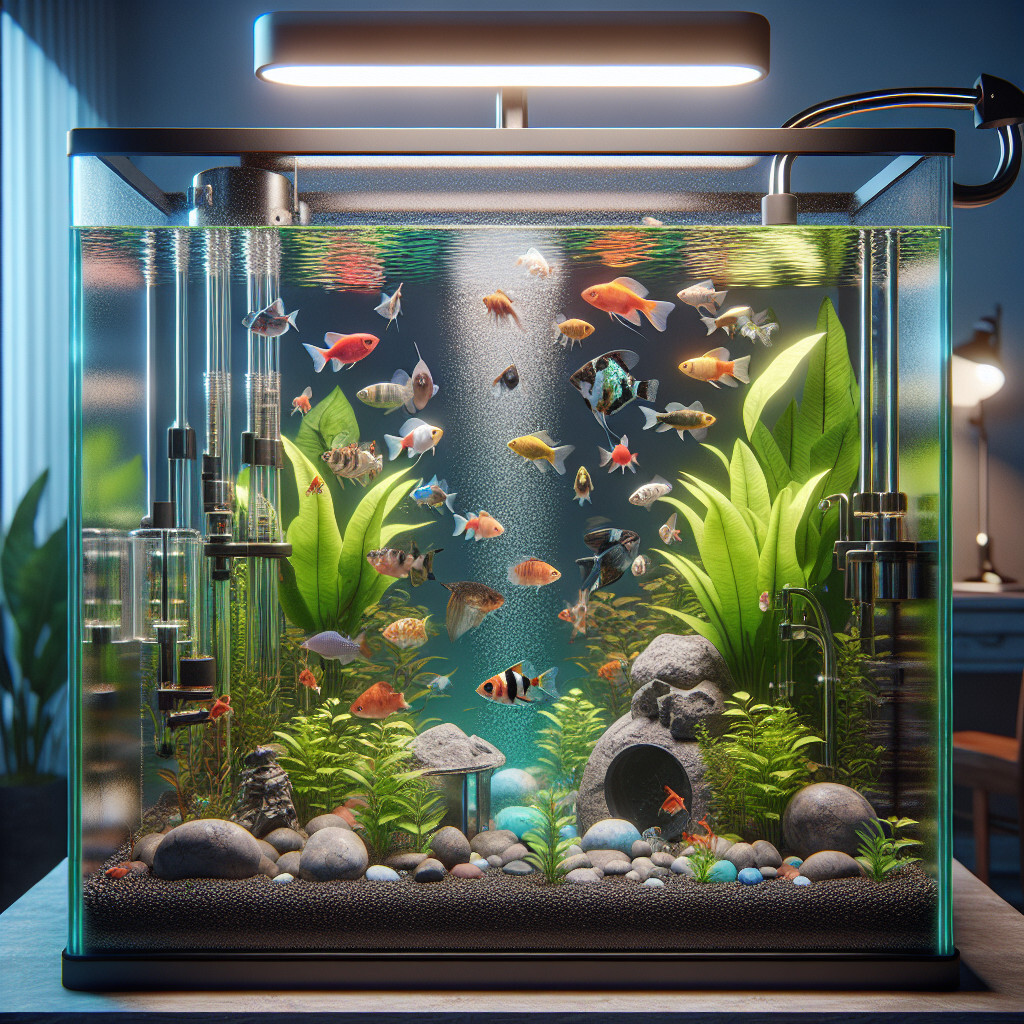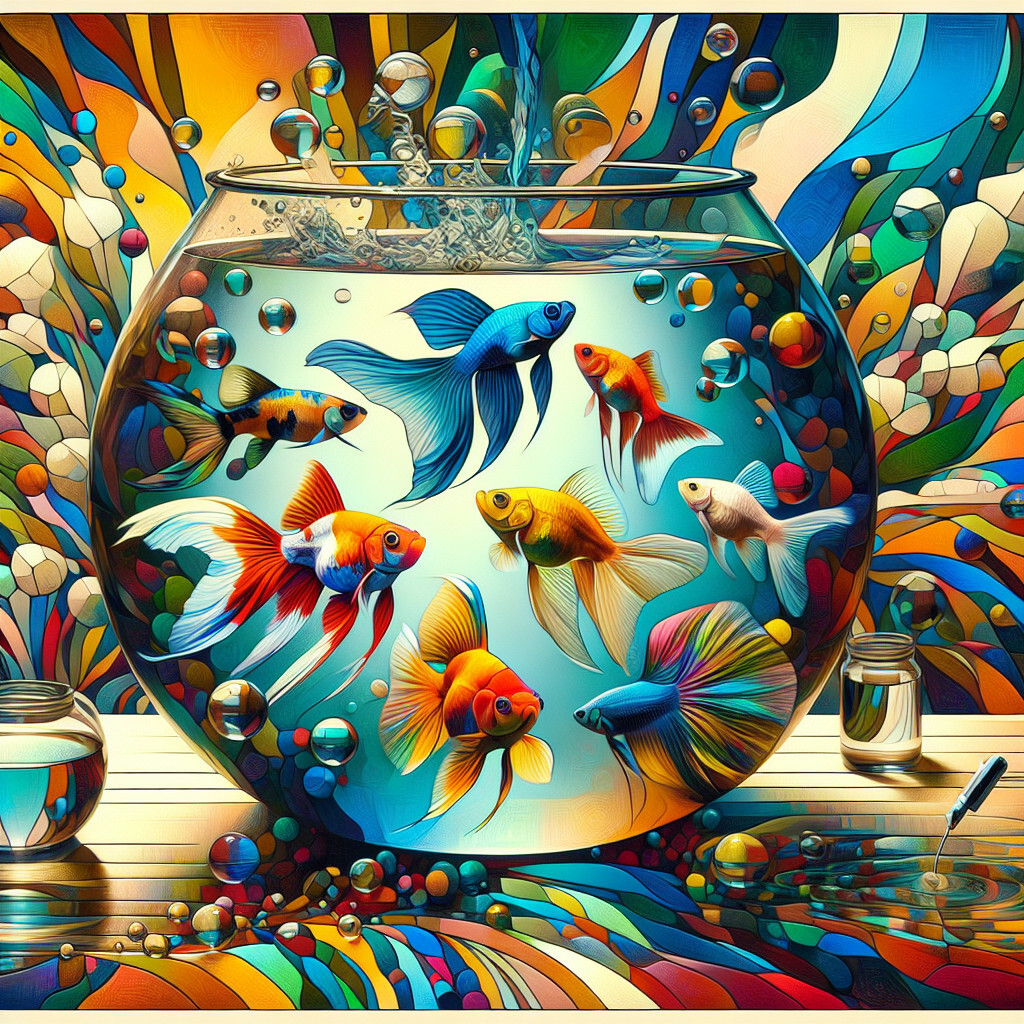-
Table of Contents
“Thriving in Simplicity: Pet Fish that Live in Tap Water.”
Introduction

Pet fish that can live in tap water are typically hardy species that can tolerate a range of water conditions, including the chlorine and other chemicals often found in tap water. These include species such as Goldfish, Betta fish, Guppies, and Zebra Danios. These fish are often popular choices for beginners due to their adaptability. However, it’s important to note that while these fish can survive in untreated tap water, it’s not necessarily the best environment for them. Most fish will thrive better in treated water that more closely mimics their natural habitat.
Understanding Which Pet Fish Can Thrive in Tap Water
Understanding which pet fish can thrive in tap water is a crucial aspect of pet ownership for those who are interested in keeping fish. It is a common misconception that all fish can survive in tap water, but the reality is that many species require specific water conditions to thrive. However, there are indeed certain types of fish that can live healthily in tap water, making them ideal for beginners or those who prefer low-maintenance pets.
Firstly, it is important to note that tap water is not inherently harmful to fish. The primary concern is the presence of chlorine, which is commonly used to treat tap water and can be toxic to fish. However, this issue can be easily resolved by using a water conditioner, which neutralizes chlorine and makes the water safe for fish.
One of the most popular types of fish that can live in tap water is the Betta fish, also known as the Siamese fighting fish. These fish are hardy and adaptable, capable of surviving in a wide range of water conditions. They are also relatively small, making them suitable for smaller tanks. However, they are known for their aggressive nature, so they should be kept alone or with non-aggressive species.
Goldfish are another type of fish that can thrive in tap water. They are often the first choice for beginners due to their hardiness and low maintenance requirements. However, goldfish produce a lot of waste, which can lead to poor water quality if not properly managed. Therefore, regular water changes and a good filtration system are essential for keeping goldfish.
Guppies are also well-suited to tap water environments. They are small, colorful fish that are easy to care for, making them a popular choice for beginners. Guppies prefer slightly warm water, but they can adapt to a range of temperatures. They are also peaceful fish that get along well with other species, making them a good choice for community tanks.
Mollies are another type of fish that can live in tap water. They are adaptable and can survive in both freshwater and saltwater environments. Mollies are also livebearers, which means they give birth to live young instead of laying eggs. This makes them an interesting choice for those who want to observe the breeding process.
In conclusion, while not all fish can live in tap water, there are several species that can thrive in such conditions. These include Betta fish, goldfish, guppies, and mollies. However, it is important to remember that even these hardy species require proper care to stay healthy. This includes using a water conditioner to neutralize chlorine, maintaining a clean tank, and providing a balanced diet. With these considerations in mind, keeping fish in tap water can be a rewarding experience.
The Top Pet Fish Species That Can Live in Tap Water
The world of pet fish is a vibrant and diverse one, teeming with a myriad of species, each with its own unique set of requirements and characteristics. However, one common question that often arises among prospective pet fish owners is whether there are species that can live in tap water. The answer is yes, there are indeed several species of pet fish that can thrive in tap water, provided certain conditions are met.
Firstly, it is important to understand that tap water is not inherently harmful to fish. The primary concern is the presence of chlorine and chloramines, which are commonly used in water treatment processes to kill bacteria and other harmful organisms. These chemicals, while beneficial to humans, can be toxic to fish. Fortunately, there are readily available water conditioners that can neutralize these chemicals, making tap water safe for fish.
One of the most popular pet fish species that can live in tap water is the Betta, or Siamese fighting fish. Known for their vibrant colors and flowing fins, Bettas are hardy fish that can adapt to a wide range of water conditions. They are labyrinth fish, meaning they can breathe atmospheric air, which allows them to survive in less-than-ideal water conditions. However, they still require a stable environment with a consistent temperature, so a heater is often necessary.
Another species that can live in tap water is the Goldfish. Despite their reputation as short-lived pets, Goldfish can actually live for many years with proper care. They are cold-water fish and do not require a heater, but they do produce a lot of waste, so a good filtration system is essential. Goldfish are also known to be social creatures, so they often do better in groups.
Guppies are another species that can thrive in tap water. These small, colorful fish are known for their hardiness and adaptability, making them a popular choice for beginners. They prefer warm water, so a heater is recommended. Guppies are also livebearers, meaning they give birth to live young instead of laying eggs, which can be an interesting aspect of pet ownership to observe.
Lastly, Zebra Danios are a species that can live in tap water. These small, striped fish are known for their active behavior and can add a lot of movement to an aquarium. They are also hardy and can adapt to a wide range of water conditions. However, they are schooling fish and should be kept in groups of at least five.
In conclusion, while there are several species of pet fish that can live in tap water, it is important to remember that each species has its own specific needs and requirements. Therefore, prospective pet fish owners should do their research and ensure they can provide the necessary care for their chosen species. Additionally, while tap water can be made safe for fish with the use of water conditioners, regular water changes and good aquarium maintenance are still essential for the health and well-being of pet fish.
Exploring the Adaptability of Pet Fish to Tap Water
The adaptability of pet fish to tap water is a topic of great interest to both novice and experienced aquarists. This is primarily because the quality of water in which fish are kept significantly influences their health and longevity. While many species of fish require specific water conditions, there are a few that can thrive in tap water, making them ideal for those who prefer low-maintenance pets.
Tap water, as we know it, is treated with various chemicals to make it safe for human consumption. Chlorine, chloramines, and heavy metals are commonly found in tap water, and these substances can be harmful to fish. However, certain species of fish have demonstrated a remarkable ability to adapt to these conditions, provided the water is treated appropriately.
One such species is the Betta fish, also known as Siamese fighting fish. Betta fish are renowned for their vibrant colors and long, flowing fins. They are hardy creatures that can survive in tap water, provided it is conditioned to remove harmful chemicals. This can be achieved by using a water conditioner, which is readily available in pet stores. The conditioner neutralizes the harmful substances in the water, making it safe for the fish.
Goldfish are another species that can live in tap water. They are one of the most popular pet fish due to their bright colors and active behavior. Goldfish are quite hardy and can tolerate a wide range of water conditions. However, like Betta fish, they also require the tap water to be treated with a conditioner before it is safe for them to inhabit.
Guppies are also known for their adaptability to tap water. These small, colorful fish are often the first choice for beginners due to their hardiness and easy care. Guppies can live in tap water, but it is essential to condition the water to remove any harmful chemicals. Additionally, guppies prefer slightly warm water, so a heater may be necessary depending on the ambient room temperature.
While these fish can survive in tap water, it is crucial to note that survival is not the same as thriving. Even though these species are hardy, they still require proper care to ensure they live a healthy and happy life. This includes regular feeding, maintaining a clean tank, and monitoring the water’s pH levels.
Moreover, it is important to remember that tap water quality can vary greatly depending on the location. Therefore, it is always a good idea to test the water for any harmful substances before introducing fish. Many pet stores offer water testing services, or you can purchase a home testing kit.
In conclusion, while there are several species of pet fish that can live in tap water, it is essential to treat the water to remove any harmful chemicals. Betta fish, goldfish, and guppies are among the most adaptable species. However, proper care and maintenance are still required to ensure the fish live a healthy and long life. Always remember to test the water quality, regardless of the species you choose, to provide the best possible environment for your pet fish.
The Survival Guide: Keeping Pet Fish in Tap Water
Keeping pet fish can be a rewarding experience, offering a glimpse into the fascinating underwater world. However, maintaining the right water conditions for your fish can be a daunting task, especially for beginners. One of the most common questions that arise is whether pet fish can live in tap water. The answer is yes, but with a few important caveats.
Tap water is readily available and cost-effective, making it an attractive option for filling your fish tank. However, it’s crucial to understand that not all tap water is the same. The quality and composition of tap water can vary significantly depending on your location. Some tap water may contain high levels of chlorine, chloramines, heavy metals, or other harmful substances that can be detrimental to fish health. Therefore, it’s essential to test your tap water before introducing your fish to ensure it’s safe.
Certain species of fish are more adaptable to tap water conditions than others. Goldfish, for instance, are known for their hardiness and can tolerate a wide range of water conditions, making them suitable for tap water environments. Betta fish, also known as Siamese fighting fish, are another popular choice for tap water tanks. They are native to stagnant water bodies in Asia and have evolved to survive in less-than-ideal water conditions. Guppies, mollies, and swordtails are other examples of fish that can thrive in tap water, provided the water is treated appropriately.
Before introducing your fish to tap water, it’s crucial to treat the water to remove any harmful substances. Dechlorination is a vital step in this process. Chlorine and chloramines are commonly added to tap water to kill bacteria and other pathogens, but they can be harmful or even lethal to fish. Fortunately, there are several commercially available water conditioners that can effectively neutralize these chemicals.
In addition to dechlorination, it’s also important to adjust the pH of your tap water. Fish require a specific pH range to survive, which can vary depending on the species. Most tropical fish prefer a pH between 6.5 and 7.5, while goldfish and other cold-water species can tolerate a wider range. You can use pH adjusters to raise or lower the pH of your tap water as needed.
Temperature is another critical factor to consider. Different fish species have different temperature requirements, and sudden changes in temperature can cause stress or even death. Therefore, it’s essential to maintain a stable temperature in your fish tank. You can use a heater or a chiller to adjust the water temperature as needed.
Lastly, it’s important to remember that even if your tap water is safe for fish, it may not provide all the necessary nutrients for their growth and well-being. Therefore, it’s essential to supplement your fish’s diet with high-quality fish food and occasionally add essential minerals and vitamins to the water.
In conclusion, while tap water can be a viable option for keeping pet fish, it requires careful preparation and ongoing maintenance to ensure it’s safe and healthy for your aquatic friends. By understanding the specific needs of your fish and taking the necessary steps to meet them, you can create a thriving environment for your pet fish in tap water.
Q&A
1. Question: Can goldfish live in tap water?
Answer: Yes, goldfish can live in tap water, but it should be treated with a water conditioner to remove chlorine and other harmful chemicals.
2. Question: Is tap water safe for betta fish?
Answer: Tap water can be used for betta fish, but it needs to be treated with a water conditioner to remove harmful chemicals like chlorine.
3. Question: Can guppies survive in tap water?
Answer: Yes, guppies can survive in tap water, but it should be treated with a water conditioner to remove harmful substances.
4. Question: Can mollies live in untreated tap water?
Answer: No, mollies cannot live in untreated tap water. The water needs to be treated with a conditioner to remove harmful chemicals.
Conclusion
In conclusion, certain types of pet fish such as goldfish, bettas, guppies, and white cloud minnows can live in tap water. However, it’s crucial to treat the tap water first to remove harmful chemicals like chlorine, which can be harmful to fish.






